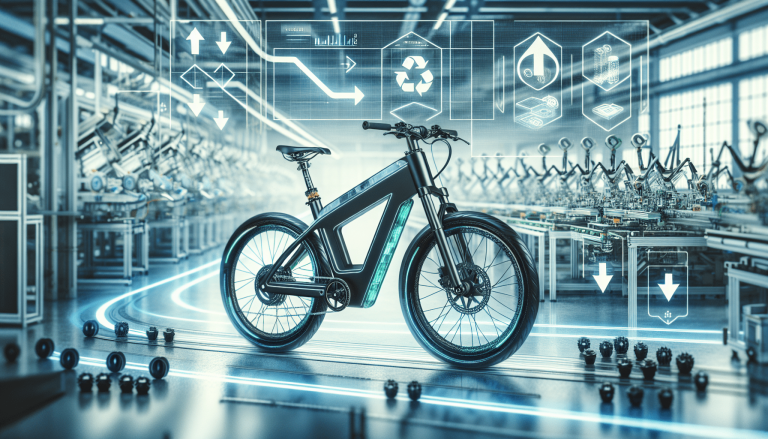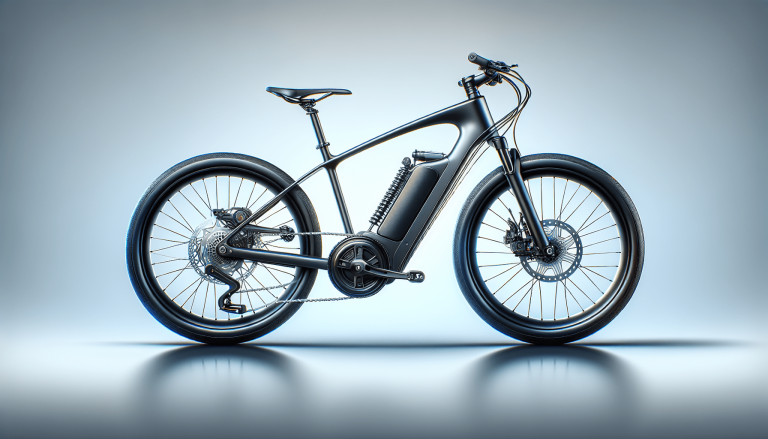Which Is The Best Battery For Electric Bikes?
Are you in the market for an electric bike and trying to figure out which battery is the best option for you? Look no further! In this article, we will explore the various battery options available for electric bikes and discuss their pros and cons. Whether you’re a commuter looking for a long-lasting battery or an adventure seeker in need of a high-performance option, we’ve got you covered. Join us as we unravel the mystery of finding the best battery for your electric bike!

Factors to Consider When Choosing a Battery
When it comes to choosing a battery for your electric bike, there are several factors that you need to consider to ensure that you make the right choice. These factors include capacity, voltage, weight, battery life, and charging time.
Capacity
The capacity of a battery refers to the amount of energy it can store. It is measured in ampere-hours (Ah). When choosing a battery, it is important to consider your daily commuting needs. If you have longer commutes, you will need a battery with a higher capacity to ensure that it can provide enough power for your entire journey.
Voltage
Voltage is another important factor to consider when choosing an electric bike battery. It determines the power output of the battery and affects the overall performance of your bike. Most electric bike batteries have a voltage of 36V or 48V. Higher voltage batteries generally provide more power and better performance, but they may also be more expensive.
Weight
The weight of the battery is another key factor to consider. Electric bike batteries can be quite heavy, and this weight can impact the overall weight and balance of your bike. It is important to choose a battery that is not too heavy to ensure a comfortable and stable ride.
Battery Life
Battery life refers to the duration of time that a battery can provide power before it needs to be recharged. This is an important factor to consider, especially if you have long commutes or require your bike for extended periods of time. Look for batteries with a longer battery life to ensure that you won’t run out of power in the middle of your journey.
Charging Time
The charging time of a battery is another crucial factor to consider. Some batteries can take several hours to fully charge, while others may charge much faster. If you need your electric bike for daily commuting, it is important to choose a battery that can be charged quickly to minimize downtime.
Types of Electric Bike Batteries
Now that we have discussed the factors to consider when choosing a battery, let’s take a closer look at the different types of electric bike batteries available in the market.
Lead-Acid Batteries
Lead-acid batteries are one of the oldest and most affordable types of electric bike batteries. They are also quite heavy and bulky, which can affect the overall weight and balance of your bike. Lead-acid batteries have a limited capacity and shorter battery life compared to other battery types. However, they are still a popular choice for electric bike riders on a budget.
Lithium-Ion Batteries
Lithium-ion batteries are the most commonly used batteries in electric bikes today. They are lightweight, compact, and have a high energy density, which allows them to provide a longer battery life. Lithium-ion batteries also have a higher voltage, which improves the overall performance of the bike. While they are generally more expensive than lead-acid batteries, their reliability and performance make them a popular choice among electric bike riders.
Nickel-Metal Hydride (NiMH) Batteries
Nickel-metal hydride (NiMH) batteries are another option for electric bike riders. They have a higher energy density than lead-acid batteries and offer a longer battery life. NiMH batteries are also more environmentally friendly than lead-acid batteries as they do not contain toxic metals. However, they are heavier and bulkier than lithium-ion batteries, which may impact the weight and balance of your bike.
Nickel-Cadmium (NiCd) Batteries
Nickel-cadmium (NiCd) batteries are not as commonly used in electric bikes as they once were. They have a lower energy density and shorter battery life compared to other battery types. NiCd batteries are also environmentally unfriendly as they contain toxic metals. Due to these disadvantages, NiCd batteries are not as popular among electric bike riders today.
Advantages and Disadvantages of Each Battery Type
Now that we have discussed the different types of electric bike batteries, let’s take a closer look at the advantages and disadvantages of each battery type.
Lead-Acid Batteries
Advantages:
- Affordable
- Widely available
- Suitable for riders on a budget
Disadvantages:
- Bulky and heavy
- Limited capacity
- Shorter battery life
- Longer charging time
Lithium-Ion Batteries
Advantages:
- Lightweight and compact
- High energy density
- Long battery life
- Quick charging time
Disadvantages:
- More expensive than lead-acid batteries
Nickel-Metal Hydride (NiMH) Batteries
Advantages:
- Higher energy density than lead-acid batteries
- Longer battery life than lead-acid batteries
- More environmentally friendly than lead-acid batteries
Disadvantages:
- Heavier and bulkier than lithium-ion batteries
Nickel-Cadmium (NiCd) Batteries
Advantages:
- None
Disadvantages:
- Lower energy density than other battery types
- Shorter battery life than other battery types
- Not environmentally friendly
Popular Electric Bike Battery Brands
Now that we have discussed the different types of electric bike batteries and their advantages and disadvantages, let’s take a look at some popular electric bike battery brands in the market.
Bosch
Bosch is a well-known brand in the electric bike industry, and they offer a range of high-quality batteries. Their batteries are known for their reliability, performance, and long battery life. Bosch batteries are compatible with a wide range of electric bike models and are widely used by electric bike enthusiasts.
Shimano
Shimano is another reputable brand that offers reliable and high-performance electric bike batteries. Their batteries are known for their durability and longevity. Shimano batteries are designed to provide consistent power output and have a long battery life, making them a popular choice among electric bike riders.
Samsung
Samsung is not only known for their smartphones and electronics but also for their electric bike batteries. Samsung batteries are known for their high energy density, long battery life, and quick charging time. They are designed to provide reliable power output and are compatible with a wide range of electric bike models.
LG
LG is another popular brand that offers high-quality electric bike batteries. LG batteries are known for their reliability, performance, and long-lasting battery life. They are designed to provide consistent power output and have a quick charging time. LG batteries are widely used by electric bike riders who prioritize performance and longevity.
Panasonic
Panasonic is a trusted brand in the electronics industry, and they also offer electric bike batteries of exceptional quality. Panasonic batteries are known for their high energy density, long battery life, and quick charging time. They are designed to provide a reliable power source for electric bikes and are widely used by electric bike enthusiasts.

Comparison of Battery Brands
Now that we have explored some popular electric bike battery brands, let’s compare them based on different factors.
Capacity
When comparing battery brands, it is important to consider their capacity. A higher capacity means that the battery can store more energy and provide a longer battery life. Bosch, Shimano, Samsung, LG, and Panasonic all offer batteries with varying capacities, allowing you to choose the one that best suits your commuting needs.
Voltage
Voltage is another important factor to consider when comparing battery brands. A higher voltage generally means better performance and power output. Bosch, Shimano, and Panasonic offer batteries with 36V and 48V options, while Samsung and LG offer batteries with 48V options. Consider your power needs and the compatibility with your electric bike when choosing a battery brand.
Weight
Battery weight can impact the overall weight and balance of your electric bike. When comparing battery brands, consider the weight of their batteries and choose one that is not too heavy for your bike. Some brands may offer lightweight options, while others may have slightly heavier batteries.
Battery Life
Battery life is an important factor to consider when comparing battery brands. Look for brands that offer batteries with longer battery life to ensure that you won’t run out of power during your commutes. Bosch, Shimano, Samsung, LG, and Panasonic all offer batteries with varying battery life, so choose the one that aligns with your daily commuting needs.
Charging Time
Charging time is another crucial factor to consider when comparing battery brands. Look for brands that offer batteries with quick charging times to minimize downtime. Some brands may offer faster-charging options, while others may take longer to charge. Consider your daily routine and charging habits when choosing a battery brand.
Battery Maintenance and Care
Proper maintenance and care are essential to ensure the longevity and performance of your electric bike battery. Here are some tips for maintaining and caring for your battery:
Proper Charging
Follow the manufacturer’s instructions for charging your battery. Use the recommended charger and avoid overcharging or undercharging the battery. Overcharging can degrade the battery life, while undercharging can reduce its capacity.
Storage
If you are not using your electric bike regularly, it is important to store the battery properly. Avoid extreme temperatures and store the battery in a cool and dry place. It is also recommended to charge the battery to around 50 percent before storing it for an extended period.
Cleaning and Protection
Keep your battery clean and protected from dirt, dust, and moisture. Wipe it down regularly and avoid using harsh chemicals or abrasive materials. If your battery has a protective cover or case, make sure it is securely in place to prevent damage.

Tips for Extending Battery Life
To maximize the lifespan and performance of your electric bike battery, consider the following tips:
Optimal Charging Practices
Avoid fully depleting your battery before recharging it. Instead, aim to keep the battery level between 20 to 80 percent. This helps to reduce strain on the battery and extends its overall life.
Avoiding Extreme Temperatures
Extreme temperatures can negatively affect the performance and lifespan of your battery. Avoid exposing your battery to excessive heat or cold, as this can cause damage and reduce its capacity. Try to store your bike and battery in a climate-controlled environment when not in use.
Regular Maintenance and Inspections
Regularly inspect your battery for any signs of damage or wear. Look for cracks, leaks, or any abnormalities. If you notice any issues, take your bike and battery to a professional for inspection and repairs. Additionally, ensure that all connections and terminals are clean and secure to maintain optimal performance.
Proper Storage Techniques
If you are not planning to use your electric bike for an extended period, consider removing the battery and storing it separately. This reduces the risk of any electrical issues or damage occurring during storage. Store your battery in a cool, dry place and make sure it is charged to around 50 percent to prevent self-discharge.
Budget Considerations
When choosing an electric bike battery, budget considerations are important. Different battery types and brands come at varying price points, so it is essential to find a balance between cost and quality. While lead-acid batteries may be more affordable, they have several disadvantages compared to lithium-ion or NiMH batteries. Consider your long-term savings and the value for money when making your decision.

Safety Precautions
Safety should always be a top priority when it comes to electric bike batteries. Here are some safety precautions to keep in mind:
Use of Certified Batteries
Ensure that the battery you choose meets the necessary safety standards and certifications. Investing in a certified battery reduces the risk of safety issues and ensures a reliable and safe riding experience.
Proper Installation and Handling
Follow the manufacturer’s instructions for installing and handling the battery. Improper installation or mishandling the battery can lead to electrical issues or accidents. If you are unsure, consult a professional for assistance.
Protection from Extreme Conditions
Protect your battery from extreme conditions such as excessive heat, cold, or moisture. Extreme temperatures can impact the performance and lifespan of the battery, so it is important to avoid exposing it to such conditions.
Conclusion
Choosing the best battery for your electric bike requires careful consideration of various factors, such as capacity, voltage, weight, battery life, and charging time. Each battery type has its own advantages and disadvantages, so it is important to weigh them against your specific needs and budget. Popular electric bike battery brands like Bosch, Shimano, Samsung, LG, and Panasonic offer reliable and high-performance batteries. Proper maintenance, care, and optimal charging practices will help extend the life of your battery. By considering all these factors and following the safety precautions, you can choose the right battery for your electric bike and enjoy a reliable and efficient ride.







